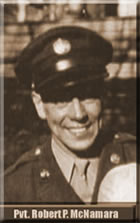
Robert Patrick McNamara — L Company, third battalion, 358th Infantry Regiment, 90th Division
PART 03:
75 Years and Three Generations Later:
D-Day Remembered — A Story of War, Fate and Homage
On July 4th Pvt. Bill Rhodes and my grandfather walked down a steep embankment across railroad tracks, lining up along a first hedgerow facing the enemy. 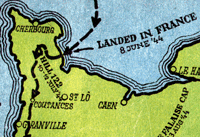 The famous hedgerow country of Normandy brought forth bitter hedge to hedge combat, with each hedge forming another line of defense. The rains had begun falling, with damp, dismal weather prevailing. “The enemy clobbered us with mortar shells,” Rhodes wrote in his memoir. He remembered a mortar shell nearly killing him. If it had landed two feet to the left, it would have been him who was hit.
The famous hedgerow country of Normandy brought forth bitter hedge to hedge combat, with each hedge forming another line of defense. The rains had begun falling, with damp, dismal weather prevailing. “The enemy clobbered us with mortar shells,” Rhodes wrote in his memoir. He remembered a mortar shell nearly killing him. If it had landed two feet to the left, it would have been him who was hit.
Battle of Hill 122
By July 5th, Company L reached the town of St. Jores. On July 6th they were ordered to engage with a small German pocket of about 30 men near Lithaire. That same evening, and throughout the night, a sizable enemy force was engaged. The battalion had now moved into position on the southern slope of Hill 122 in the Foret de Mont Castre, a deeply wooded 400 foot rise where Caesar’s Legions had battled an enemy on this same spot nearly 2000 years earlier during the Gallic Wars. According to Battle History, Third Battalion 358th Infantry, it was here that the Allies ran into one of the toughest fights it had in all the time it was in Europe and the one that earned it the Presidential Unit Citation. It was bitter hand-to-hand fighting in the thick woods of a hill forest. Bill Rhodes recalled in his memoir that every minute or two a German artillery shell would come zooming in to crash and explode — followed by voices crying out for the medic. He hugged the ground and prayed. When the shelling stopped, the Lt. Commander directed him to take over his squad as his sergeant had been hit. There were only five men left alive of their original 12 man rifle squad. My grandfather was one of the seven of this squad who had been killed that night.On the night of Robert McNamara’s death, each of the 12 men in their rifle squad were fighting side by side in their foxholes. Robert had visited Bill Rhodes in his foxhole and took a swig of water out of Rhodes’ canteen. They talked briefly about the old boxing days in Cleveland, and about how my grandfather had been a Golden Glover. Private Alfred Sheridan was nearby and asked my grandfather if he would trade foxholes as he had wanted to be closer to a friend. McNamara agreed — and this last minute foxhole switch, a quick twist of fate — would determine the course of life and death for these two soldiers.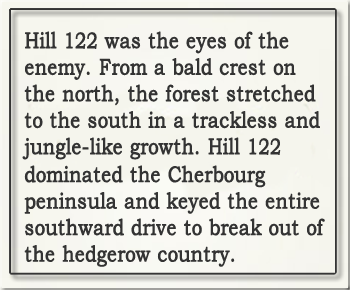
“Robert was walking around in the dark — pitch black — the night he died. He drank some water from my canteen. I don’t know how he saw. A mortar landed in his foxhole shortly after he’d switched with Private Sheridan. It killed him immediately,” remembered Bill.
It was Pvt. Alfred Sheridan’s son Dan who had connected me with Bill Rhodes in 2011. In 1999, 10 years after his father’s death, Dan had found an old cardboard box with his father’s wartime papers. He decided to put together a website piecing together the story of the 90th Infantry Division — which led him to befriend many of the surviving veterans, and which ultimately led me to making these remarkable connections. Dan shared with me that his father had mourned the fateful foxhole switch throughout his entire life. He’d talked about my grandfather with his family well until the 1980s when he died.
“During the Battle of Hill 122 my father switched foxholes with your grandfather so he could be with his buddy Whitey who had taken him under his wing. Whitey taught my father things such as not to clip the chinstrap to his helmet so he wouldn’t choke during a concussion as a result of shelling,” Dan Sheridan shared. “In telling me about the foxhole switch, my father got very choked up. I had never seen tears well up in his eyes before. He said ‘It should have been me, not McNamara.’”
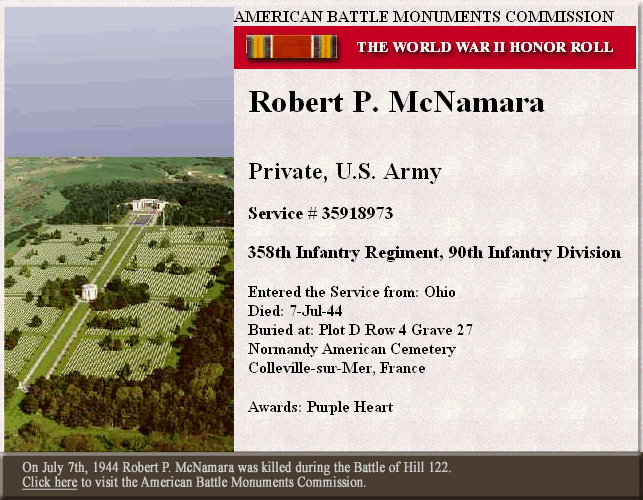 “Whenever I asked my father about his Bronze Star or Bill Rhodes about his Silver Star, they told me, ‘The real war heroes are the ones that never came home,’” Dan shared.
“Whenever I asked my father about his Bronze Star or Bill Rhodes about his Silver Star, they told me, ‘The real war heroes are the ones that never came home,’” Dan shared.
After his father’s death, Dan connected with members of the 90th Division Association and for many years asked veterans if they had known Robert McNamara. “I often asked the question, did you happen to know McNamara? Time and again the answer was no. Then one year, Norm Richards of the 90th Association told me to call Bill Rhodes. It was extremely difficult to find a surviving member of L Company, even more difficult to find one who was in the Battle of Hill 122. Bill was this person,” he recalled.
Dan included an image with my grandfather’s name listed on his website. “I posted this page as a sort-of ‘candle in the window’ for a lost soul wandering the road on a dark night. This was back in 2005 in the vain hopes that a relative might perchance find this webpage. I seriously doubted it. Then 2011 came along and the rest is a bit of a miracle,” he shared.
>> See Part 4 to Article by Deborah McNamara
Robert P. McNamara >> Part 02 | Part 03 | Part 04 | Part 05 |
Written by Deborah McNamara
Writer, sustainability activist, and author in Boulder, Colorado. Learn more at www.DebMcNamara.com
Click Link Below to Read Article by Deborah McNamara - on Medium.com
75 Years and Three Generations Later:
D-Day Remembered — A Story of War, Fate and Homage

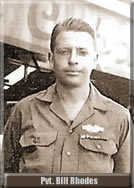 Click here
Click here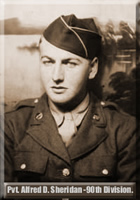 Click here
Click here